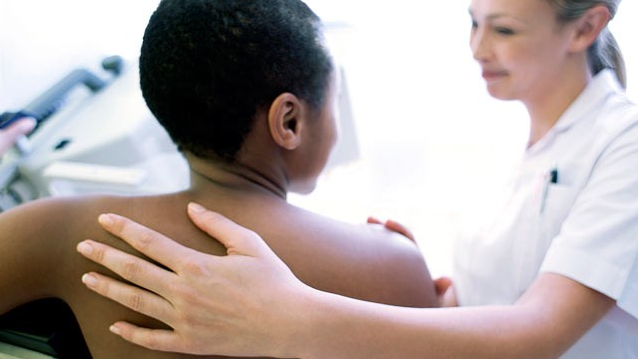
Researchers from Boston University’s (BU) Slone Epidemiology Center have developed a new breast cancer risk prediction model for African American women that showed greater accuracy in predicting risk for the disease. The use of this model could result in increased eligibility of African Americans in breast cancer prevention trials and, ultimately, may lead to better and more equitable long-term health outcomes.
Breast cancer is the most common cancer and the second most common cause of cancer deaths among women in the United States. Several decades of epidemiological research have demonstrated widespread racial disparities across a number of indicators including incidence, screening prevalence, stage at diagnosis, treatment, survival and mortality. For example, although African American women are overall less likely than white women to be diagnosed with breast cancer, they are more likely to be diagnosed at a later stage, to have more aggressive cancers, and to die from the disease.
While African American women could benefit greatly from advances in breast cancer prevention and early detection strategies, research suggests that they are missing out on many of these opportunities. For instance, doctors are less likely to recommend chemoprevention and other risk-reduction therapies for African American patients than for white patients. The effectiveness of these strategies depends in part on the ability to accurately identify individuals at increased risk of the disease.
Models for predicting absolute risk of breast cancer (i.e., the overall chance of developing breast cancer, as opposed to the relative risk compared to some other group) are used for many important purposes in oncology, such as guiding decisions about chemoprevention and determining eligibility for recruitment into clinical trials. The well-respected Gail Model has been used widely for breast cancer risk prediction in white women but has been shown to underestimate risk in African-American women. Underestimation of risk for African-American women has contributed to their under-representation in breast cancer prevention trials. According to a 2014 study, minorities make up less than five percent of all clinical trial participants; in cancer clinical trials, only 1.3 percent of participants are African American.
In this latest study, published in the Journal of Clinical Oncology, the BU researchers used prospective data from 55,000 African American women age 30-69 at baseline in the BU Black Women’s Health Study to develop a breast cancer risk prediction model specifically for African American women. It included family history of breast cancer, history of benign breast disease, age at menarche, age at first birth, bilateral oophorectomy, oral contraceptive use, hormone use, body mass index at age 18 and adult height.
“The model was well calibrated in that it predicted 486 cases in comparison to an observed 506 cases during the additional five years of follow-up,” explained senior author Julie Palmer, senior epidemiologist at BU’s Slone Epidemiology Center and professor of epidemiology at BU’s School of Public Health. “Based on the Black Women’s Health Study model, 14.6 percent of women age 30-69 were predicted to have a five-year risk of at least 1.66 percent. This is considerably higher than the proportion predicted by previous models to be above that end point,” said Palmer.
According to the researchers, previous breast cancer risk prediction models for African American women have used information on only a few factors and may have underestimated risk. “The new model appears to improve prediction and, if used for determining eligibility for entry into prevention trials, would likely result in a greater number of African American women invited to enroll in the trials,” she added.
